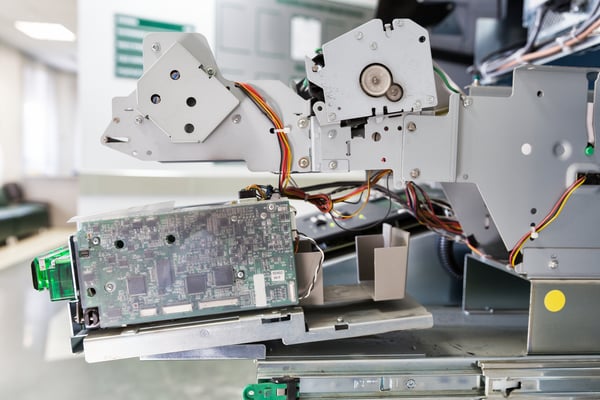Purchasing a new ATM for your fleet is an investment like any other, much like buying a car. After spending tens of thousands on your new wheels, you wouldn’t then go and ignore cracked windshields, flat tires, or squeaky brakes, would you? The same should apply to the regular servicing and repairs your ATM fleet needs over the course of its regular use.
Unfortunately, with all the attention on new features, bigger screens, and new designs, the basics of proper care and patching of ATM fleets can easily be overlooked. It can also be tough to advocate for more spending on equipment that just cost thousands to procure. But once a machine does fail, there is no missing its effects: frustrated customers, large repair bills, and worries about when it may happen next.
With the costs of downtime, here are three more reasons why following a proven servicing plan is important to you getting the most out of your ATMs:
Increases the Lifespan of Your System
The average lifespan of a newly installed ATM can range from seven to 10 years, with each device taking about five years to fully depreciate the investment expense. With such a long depreciation period that takes the majority of the expected life of the ATM itself, it’s important to find a provider with a nationwide service network that can deliver speedy, professional technical support when you need it most.
A well-maintained ATM functions more efficiently, prolonging the life of the hardware that keeps the system running. With less strain on the individual components, they can work together to increase the working lifespan of each ATM. With each additional year for each ATM, these savings and gains add up to fewer operational expenses and investment costs.
Higher Uptime
Proper maintenance and servicing of your ATM may cause small breaks in its operation, but that is nothing compared to the actual downtime caused by a complete out-of-service breakdown. Because it is scheduled at set intervals, maintenance can be conducted at an optimal time for your customers and services with limited disruption to operations.
On the other hand, an abrupt breakdown is highly inconvenient for customers and your financial institution. Not only that, but the issue can also be expensive to repair—and the machine remains idle while the issue is diagnosed, parts and technicians are found, and repairs are completed. Proactive, ongoing maintenance can identify problems before they occur so they can be addressed early, keeping your ATMs running and helping keep the downtime limited.
Saved Costs
With the cost of each new ATM running from $15,000 to $65,000, and possibly more, each is a significant investment in its own right. However, investing in proper maintenance and servicing isn’t nearly as expensive as the cost of having to buy and install a new machine due to constant hardware failures and downtime. In fact, according to figures compiled by Deloitte, ATM maintenance could run in the neighborhood of $165 per month, a mere fraction of the cost, especially with more expensive equipment.
In addition, maintenance services provided by a vendor partner can also come with warranties on the parts and hardware, including labor for the repairs completed. Technician support in emergency and off-hours situations can also be included in maintenance and warranty agreements, furthering the potential for cost savings and reduced downtime.
Final Thoughts
Fortunately, proper, timely maintenance for each piece of your ATM fleet doesn’t have to be a headache with a good servicing program. Whether with a partner vendor or with your own internal staff, by giving your fleet the attention and proactive service it needs to keep running smoothly, you can help ensure that your customers can continue to depend on your brand for all of their banking needs while keeping your overall fleet costs low.



